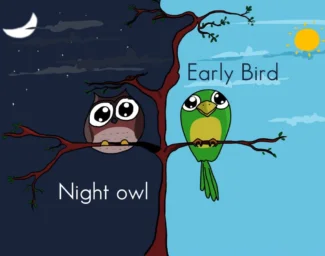Early Birds vs. Night Owls

February 27, 2023
As the sun rises, just mustering up the strength and energy to get out of bed takes everything out of you. You’re running solely on caffeine to get through the day, but it’s not until midnight, when that burst of energy hits you, that you finally get things done. However, next door someone is waking up before dawn to get everything together and complete their daily tasks before noon.
But are early birds more productive than night owls?
Chronotypes, your body’s natural tendency to wake up and fall asleep at certain times (classifying you as an early bird or night owl), cannot be changed and are relatively permanent. They don’t affect the amount of sleep you get rather when you wake up and get tired or fall asleep, which changes gradually throughout your life. Chronotypes depend primarily on genetics but other factors like age and location can influence them as well. Still, there are things people can do to maximize their productivity and make use of their energy when it comes most naturally.
Morning people or “early birds” enjoy waking up with the sun and work best in the mornings. As the day goes on, they become tired in the late afternoon and evening, allowing them to get good amounts of sleep. Many don’t socialize or have a personal life because they can’t make it to events in the evening. And while they may not always take time for themselves, they’re very goal-oriented, plan ahead, and do well academically.
Night owls or people who tend to wake up later in the day and rarely go to bed before midnight are also highly intelligent in that they’re creative thinkers. Many become musicians or authors and aren’t very physically active. They have flexible sleep schedules but can easily lose sleep during the week, therefore they must catch up on weekends, relying on caffeine more often than not. They are frequently stressed, which can potentially cause health problems like type 2 diabetes, anxiety, and depression. They get angry easily, act on impulse, and are more likely to spend excessive amounts of time on technology.
Schools and many workplaces are scheduled to benefit early birds who can get plenty done because they are most awake in the mornings. Night owls would be just as productive if their responsibilities were set to be performed at a time more convenient to them. However, getting sunlight in the mornings helps wake them up without having to chug caffeine. And exercising in the afternoon can give early birds the energy they need to stay energized in the evening. It’s also important for them to treat themselves to something they enjoy, as they often don’t.
